|
|
|
Sort Order |
|
|
|
Items / Page
|
|
|
|
|
|
|
| Srl | Item |
| 1 |
ID:
192635
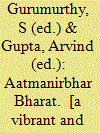

|
|
|
|
|
| Publication |
New Delhi, Aryan Books International, 2021.
|
| Description |
viii, 470p.hbk
|
| Standard Number |
9788173056543
|
|
|
|
|
|
|
|
|
|
|
|
Copies: C:1/I:0,R:0,Q:0
Circulation
| Accession# | Call# | Current Location | Status | Policy | Location |
| 060448 | 338.54/GUR 060448 | Main | On Shelf | General | |
|
|
|
|
| 2 |
ID:
148346
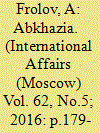

|
|
|
|
|
| Summary/Abstract |
THE COLLAPSE of the socialist world late in the 20th century and the redivision of its territory resulted in the emergence of new independent states, some of which are generally recognized while others are labeled self-proclaimed. But no matter how a new state finds its way onto the map, there will have been deep historical and cultural reasons for its coming into being. One of the new states is Abkhazia.
|
|
|
|
|
|
|
|
|
|
|
|
|
|
|
|
| 3 |
ID:
005242
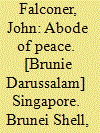

|
|
|
|
|
| Publication |
Singapore, Brunei Shell, 1993.
|
| Description |
208p.hbk
|
| Standard Number |
9813018038
|
|
|
|
|
|
|
|
|
|
|
|
Copies: C:1/I:0,R:0,Q:0
Circulation
| Accession# | Call# | Current Location | Status | Policy | Location |
| 036433 | 959.55/FAL 036433 | Main | On Shelf | General | |
|
|
|
|
| 4 |
ID:
138966


|
|
|
|
|
| Summary/Abstract |
This writing analyzes the use of symbols, art, and aesthetics in the first phase of Hong Kong’s “Occupy Central” movement. Protestors, demonstrators, and strikers appropriate symbols to put their political messages across, sometimes essentializing or reducing complicated and complex ideologies or reform initiatives to pictorial symbols and performative sessions to parsimoniously put their points across. Between the start of Hong Kong’s “Occupy Central” movement on 27 September 2014 and its temporary pause on 6 October 2014, many symbols and art forms were used to symbolize the protests including the yellow umbrella. This writing is based on the observations in Hong Kong (more than 4 years) as well as formal and informal discussions with individuals representing positions from all sides of the political divides (pro-government, pro-democracy, and pro-Beijing forces) within and outside Hong Kong. Textually, I collected media reports, downloaded digital images, and scanned and analyzed media commentaries for this writing.
|
|
|
|
|
|
|
|
|
|
|
|
|
|
|
|
| 5 |
ID:
141540
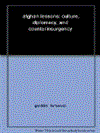

|
|
|
|
|
| Edition |
1st Indian ed.
|
| Publication |
New Delhi, Viva Books, 2015.
|
| Description |
xiii, 176p.hbk
|
| Standard Number |
9788130930206
|
|
|
|
|
|
|
|
|
|
|
|
Copies: C:1/I:0,R:0,Q:0
Circulation
| Accession# | Call# | Current Location | Status | Policy | Location |
| 058327 | 958.1046/GEN 058327 | Main | On Shelf | General | |
|
|
|
|
| 6 |
ID:
162424
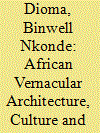

|
|
|
|
|
| Summary/Abstract |
The influence of imported material, technology and methods has put pressure on most traditional architectural systems to modernize. This influence to modernize is transmitted through various mechanisms. This paper argues that there are a number of aspects to vernacular architecture that would be lost through this conversion process to modern materials, technology and methods. Through the examination of vernacular architecture among the Lamba people of Senior Chief Mushili’s chiefdom, the study found that there are cultural, environmental and aesthetical aspects in vernacular architecture that are poorly understood in the process of modernization. Data for this research were collected through an ethnographical approach with occasional in-depth interviews with senior members of the Royal establishment and the community. Thus, the data were mainly qualitative.
|
|
|
|
|
|
|
|
|
|
|
|
|
|
|
|
| 7 |
ID:
177944
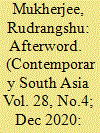

|
|
|
|
|
| Summary/Abstract |
This afterword reflects on the intellectual life of Chanchalkumar Chattopadhyaya who died at the age of 89 in 2004. Mr Chattopadhyaya, who lived in a small flat in north Calcutta, taught himself Greek, Latin and French, and it was the learning of the Italian language which introduced him to his life's great love, Dante. His other great love was western classical music. Mr Chattopadhyaya, who I refer to in this text as Chanchalbabu, represents a lost sensibility which was once integral to the culture and history of Calcutta. Despite being scoffed at, he, along with the other marginal characters in this anthology who are navigating, moulding and defying mainstream aesthetic narratives in Calcutta, remained committed to the passionate pursuit of knowledges which drew upon the best of European culture.
|
|
|
|
|
|
|
|
|
|
|
|
|
|
|
|
| 8 |
ID:
138518


|
|
|
| 9 |
ID:
188682
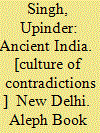

|
|
|
|
|
| Publication |
New Delhi, Aleph Book Company, 2021.
|
| Description |
xv, 263hbk
|
| Standard Number |
9789390652617
|
|
|
|
|
|
|
|
|
|
|
|
Copies: C:1/I:0,R:0,Q:0
Circulation
| Accession# | Call# | Current Location | Status | Policy | Location |
| 060302 | 934.01/SIN 060302 | Main | On Shelf | General | |
|
|
|
|
| 10 |
ID:
170751
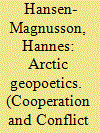

|
|
|
|
|
| Summary/Abstract |
The article develops a geopoetic approach to Russian Arctic politics. It rests on the empirical observation that due to climate change, the Arctic landscape is undergoing profound transformations, which has led to multilateral governance efforts but also unilateral pursuits. In this general heterogeneity, Russia’s policies have raised the most pressing questions regarding the country’s motivations to engage in the region. Cultural approaches to global politics are most suitable to create holistic understandings and explanations in this regard, but they lack discussing a spatial dimension of Russian identity. By developing a geopoetic account, the article complements this research through methodological insights from critical geography. Geopoetics focuses on the cultural roots and their cognitive-emotional dimension, on the basis of which claims to the Arctic and related policies resonate with a broader audience. The article argues that Russian policies have their foundation in a utopian ideal of Soviet socialist realism that was widely popularised in the 1920s and later decades. Applying the hermeneutic tool of topos, the article highlights that three features stand out that interweave into a coherent imaginary of the Arctic: first, the heroic explorer; second, the conquest of nature; and third, the role of science and technology. Analysts would do well to bear in mind how the Arctic becomes intelligible when commenting on policies.
|
|
|
|
|
|
|
|
|
|
|
|
|
|
|
|
| 11 |
ID:
187620
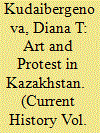

|
|
|
|
|
| Summary/Abstract |
Recent events in Kazakhstan show that political art has the potential to be a potent form of protest in some of the most authoritarian states in contemporary Central Asia. After the collapse of the Soviet Union, artists in Kazakhstan and elsewhere in the region began turning away from the canon of Socialist Realist art, with its sole aim of serving the regime and depicting its visions of the future. New forms of contemporary art emerged, drawing sharp contrasts with official art in form, content, and culture, as more artists insisted on freedom from state patronage and control. In the political upheaval following the resignation of long-ruling President Nursultan Nazarbayev, artists have inspired protests with pointed critiques.
|
|
|
|
|
|
|
|
|
|
|
|
|
|
|
|
| 12 |
ID:
140814
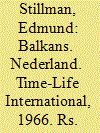

|
|
|
|
|
| Publication |
Nederland, Time-Life international, 1966.
|
| Description |
159p.: ill.hbk
|
|
|
|
|
|
|
|
|
|
|
|
Copies: C:1/I:0,R:0,Q:0
Circulation
| Accession# | Call# | Current Location | Status | Policy | Location |
| 000432 | 949.6/STI 000432 | Main | On Shelf | General | |
|
|
|
|
| 13 |
ID:
167644
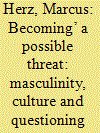

|
|
|
|
|
| Summary/Abstract |
A debate on masculinity and immigration rose across Europe in 2015 after an incident with sexual harassments taking place in Cologne, Germany. The incident refuelled a debate positioning unaccompanied young men as a possible threat. This article is based on a research project where we during this time ethnographically followed 20 young men, having arrived in Sweden as ‘unaccompanied’ minors. The aim is to examine how the young men themselves talk about, reflect on and negotiate masculinity and gender during this period. The article concludes that masculinity cannot be approached as something stable easily being inherited or transferred from one’s origins. One difference for ‘unaccompanied’ young men is how conflicts or tensions emerging in relation to issues of gender and masculinity tend to be interpreted differently, and publicly, putting the young men in a ‘gendered situation of questioning’.
|
|
|
|
|
|
|
|
|
|
|
|
|
|
|
|
| 14 |
ID:
185758
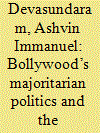

|
|
|
|
|
| Summary/Abstract |
India’s mainstream film industry has increasingly fallen under the influence of the Hindu nationalist ruling party and its agenda. But a thriving, multilingual independent sector is producing creative counternarratives.
|
|
|
|
|
|
|
|
|
|
|
|
|
|
|
|
| 15 |
ID:
146783
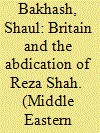

|
|
|
|
|
| Summary/Abstract |
On the eve of the Anglo-Soviet invasion of Iran in the Second World War, Sir Reader Bullard, the British minister in Tehran, urged on his government the desirability of removing the Iranian ruler, Reza Shah, from office. Association with the ‘universally detested’ shah, whom he described as a ‘greedy ignorant savage’, was detrimental to Britain's interests and its war effort. In the weeks that followed the Anglo-Soviet occupation of Iran, Bullard continued to press for and to shape the ultimate British decision to force Reza Shah to abdicate and go into exile. Yet, this was not always Bullard's view of Britain's relationship with the Iranian ruler. When he presented his credentials 20 months earlier, Bullard described it as his ‘urgent duty’ to win Reza Shah's favour. Nor did Bullard's insistence that Britain depose the Shah initially find favour with the Foreign Secretary, Anthony Eden, his Middle East staff at the Foreign Office, or with Churchill. This article traces the evolution of Bullard's own view of Reza Shah and the developments that led the Foreign Office, initially eager to win Reza Shah's favour and even ready to offer Reza Shah a ‘substantial bribe’ for his cooperation, to take steps to topple Reza Shah from the throne.
|
|
|
|
|
|
|
|
|
|
|
|
|
|
|
|
| 16 |
ID:
137349
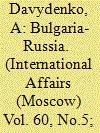

|
|
|
|
|
| Summary/Abstract |
The conference was sponsored by Bulgaria's nongovernmental organizations: the Slavyane Foundation, the Bulgaria-Russia Foundation, the Bulgaria-Russia Forum, and the Federation of Friendship with Peoples of Russia and the CIS. Assistance in organizing the conference was provided by the Diplomatic Institute of the Ministry of Foreign Affairs of the Republic of Bulgaria, the National Association of International Relations, the Bulgarian Diplomatic Society, and the Bulgarian Academy of Sciences.
|
|
|
|
|
|
|
|
|
|
|
|
|
|
|
|
| 17 |
ID:
140768
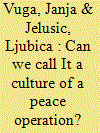

|
|
|
|
|
| Summary/Abstract |
The following article does not discuss various aspects of international cooperation on the political and strategic levels but considers the challenge of cross-cultural cooperation among service members in the field. Cooperation in a culturally diverse environment is influenced by various cultures and identifications (the national culture, military organizational culture, social identities). Based on the presumption that the culture is manifested through the values, rituals, symbols, practices, and language, the thesis about the existence of peace operations’ culture was tested. The main research questions were: (a) how are national and military cultures manifested in a peace operation?; (b) does the culture of a peace operation exist?; and (c) do service members of various nationalities identify themselves with a peace operation? The study was conducted among Italian and Slovenian service members deployed to at least one peace operation. The results show that a peace operation develops practices, values, symbols, rituals, and a common language. Hence we can speak of a peace operation’s culture. The service members’ identification with the peace operation is strong during the deployment; however, sources of identification vary depending on one’s position in the peace operation (i.e., national unit, multi-national HQ). Service members in HQs develop a strong sense of belonging to the multi-national working team, while the main source of common identity for bigger national units is the local environment.
|
|
|
|
|
|
|
|
|
|
|
|
|
|
|
|
| 18 |
ID:
140900
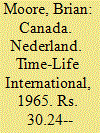

|
|
|
|
|
| Publication |
Nederland, Time-Life international, 1965.
|
| Description |
159p.:maps, photographhbk
|
|
|
|
|
|
|
|
|
|
|
|
Copies: C:1/I:0,R:0,Q:0
Circulation
| Accession# | Call# | Current Location | Status | Policy | Location |
| 000834 | 971/MOO 000834 | Main | On Shelf | General | |
|
|
|
|
| 19 |
ID:
180003
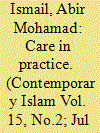

|
|
|
|
|
| Summary/Abstract |
Recent studies conclude that ethnic minority families in Denmark tend to be dismissive of senior housing and municipal homecare services for elderly family members. A large proportion of Muslim minority families in Denmark attach great importance to caring for the elderly as a tradition and prefer to take care of their own elderly family members at home. Nevertheless, the fact that morality, incentives, and obligations in relation to care for the elderly may be legitimized and/or contested with reference to cultural traditions and Islam has not received much attention in current research. In this article, drawing on material from ongoing ethnographic fieldwork among Arab Muslim families in Denmark, I discuss how cultural and religious backgrounds may determine and influence perceptions and behavior regarding care for the elderly. By observing and engaging in the everyday life of an Arab Muslim family, I explore how caring for elderly people with health problems at home raises specific questions about obligations and triggers negotiations across genders and generations. I argue that besides kinship and ethnicity, it is equally important to consider religiosity in an attempt to learn more about how Arab Muslims care for their elderly family members.
|
|
|
|
|
|
|
|
|
|
|
|
|
|
|
|
| 20 |
ID:
151137
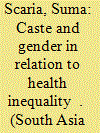

|
|
|
|
|
| Summary/Abstract |
This article is based on a micro-level village study in
Kerala, the southernmost Indian state with its long-standing
impressive basic indicators in health, economic growth and social
development. Using the theoretical perspective of ‘cultural inflation
of morbidity’ for a hypothesis of continuing inequities in health
outcomes, it examines how far such impressive basic indicators have
actually translated into equity in health outcomes, defined in terms
of incidence of morbidity and morbidity pattern. Confirming the
hypothesis, the findings discuss to what extent both caste and gender,
separately and together, may be continuing today to mediate health
outcomes in a changing socio-economic environment.
|
|
|
|
|
|
|
|
|
|
|
|
|
|
|
|
|
|
|
|
|